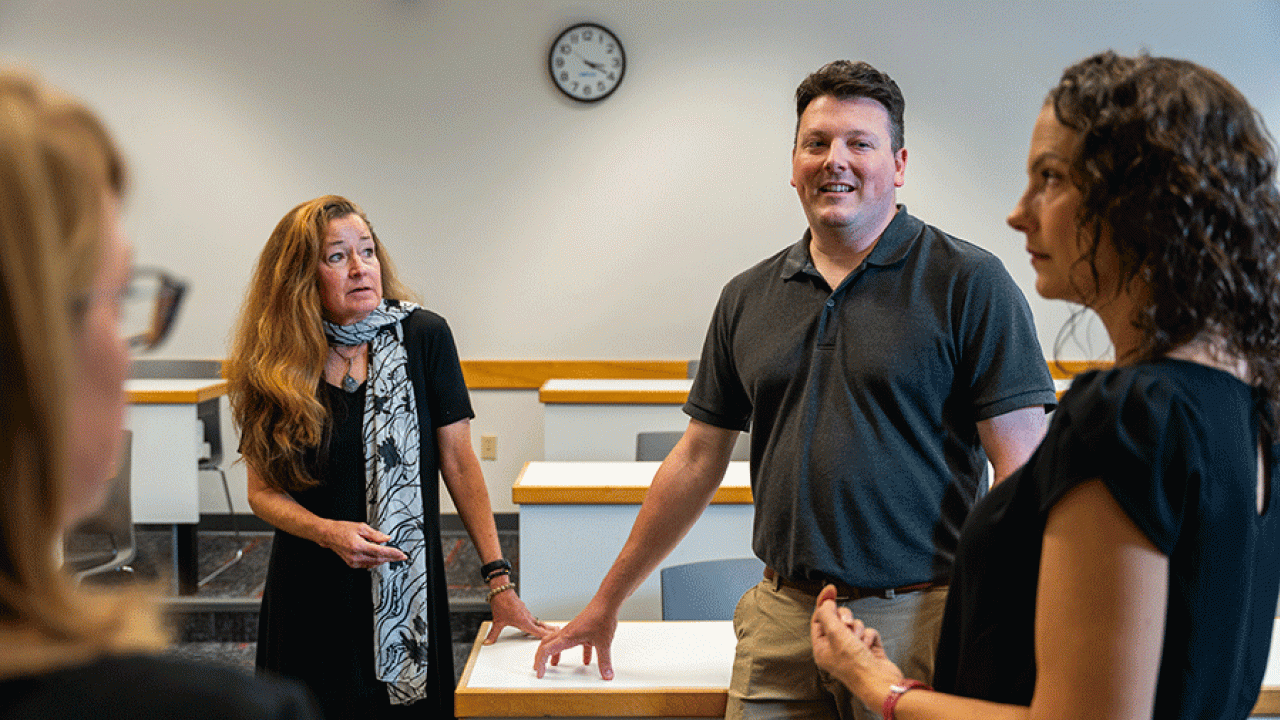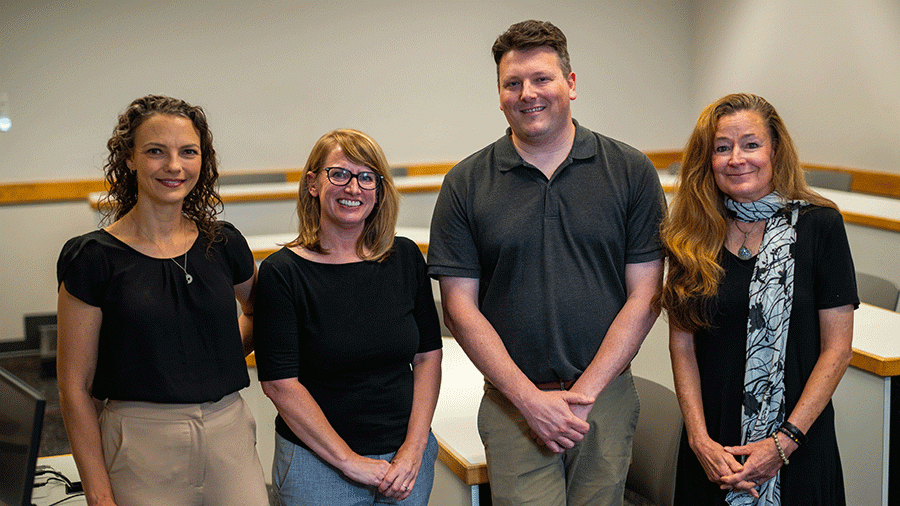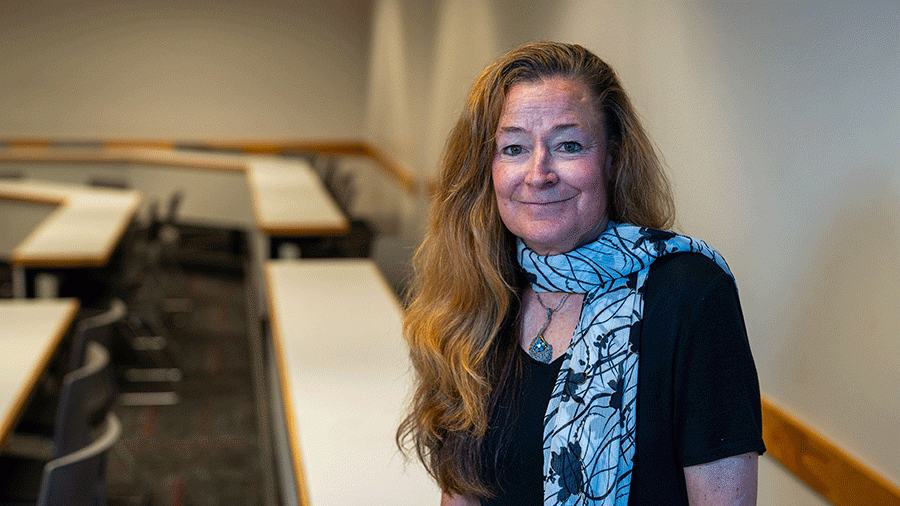Amy Schmitz, the John Deaver Drinko-Baker & Hostetler Chair in Law, discusses JusticeTech with program partners Robert Southers and Julia Armstrong, managing director of the Institute for Cybersecurity and Digital Trust.
(Photos by David Holm)

Amy Schmitz, the John Deaver Drinko-Baker & Hostetler Chair in Law, discusses JusticeTech with program partners Robert Southers and Julia Armstrong, managing director of the Institute for Cybersecurity and Digital Trust.
(Photos by David Holm)
Ohio’s capital city is growing quickly — 38% faster than the national average in 2024. That’s great news for the region, but it has led to a housing shortage, rising rents and a steady stream of evictions.
Those evictions are processed downtown at the Franklin County Municipal Courthouse. On the 16th floor, you will find the Self Help Center and Dispute Resolution Department, the first office of its kind in Ohio. Launched in 2016, the center provides free legal assistance — not advice — to anyone who has a civil legal issue in court. In 2024, the Self Help Center logged more than 34,000 visitors, and about 25,000 of them sought help for housing-related issues.
Robert Southers ’14, ’17 MA, ’17 JD, directs the center with four other attorneys and a social worker. Because of the vital role the Self Help Center plays in tenant education and mediation services, Southers was driven to explore ways to assist renters even more effectively.
He turned to Amy Schmitz, JD, professor at The Ohio State University Moritz College of Law and director of the JusticeTech program, which addresses access to justice challenges using artificial intelligence and other technology solutions.
The program's capstone class brings together students from the Moritz College of Law and the Department of Computer Science and Engineering to design and develop legal technologies for community partners at no cost.
Schmitz started JusticeTech in 2023 with grant funding from the Good-to-Great program, sponsored by Ohio State’s Office of Academic Affairs. “It’s so vital to have law students and computer science students working in teams to design, build and test these technologies,” she says. “Having them learn each other’s language will be very powerful in the marketplace.”
The collaboration isn’t without its challenges. “It can be tough for teamwork,” Schmitz says. “But it’s really good for them, because in the real world you have to work with anyone and everyone. That’s what lawyers do.”
“There was a communication and knowledge gap that we had to bridge early on. It was easy to get siloed,” says Ian Pitt’ 25 JD. “Navigating that dynamic gave me a sense of what it would be like to be a legal counsel at a startup legal/AI company.”
Pitt focused his capstone on eviction and saw firsthand the challenges facing tenants.
“Navigating the court itself is extremely overwhelming and confusing. Three members of our team got lost trying to find the Self Help Center,” says Pitt, who noticed dozens of tenants squeezed into a hallway while awaiting their hearings. “It underscores the importance of having a mobile-friendly, online process where tenants can evaluate options on their own time outside of the pressures of the court system.”
“You could see the students’ eyes getting wide,” Southers says. “I don't know if they would have ever gained that knowledge had it not been for this class.”

Once Pitt and fellow capstone students on the eviction team understood how the Self Help Center operated, they began working on technology solutions. “The students bring in new ideas and a fresh perspective,” Southers says. “Most of the students are also tenants, so they know what it’s like living with a landlord and experiencing some of the challenges tenants face.”
JusticeTech collaborated with the Self Help Center on two projects. One is an online resource tool that helps tenants find legal and financial assistance. “A tenant can put in basic information about their household and their income, and the tool would triage the help available,” Southers says. “It would also connect tenants to a web chat with our Self Help Center attorneys. Instead of traveling to the courthouse, you can just message us.”
The other eviction project focused on an online platform for dispute resolution before an eviction is filed. “So many issues arise when evictions occur,” Pitt says. “When a landlord files an eviction, it stays on a tenant’s permanent record, which can have detrimental effects on job prospects and the ability to obtain future housing.”
Instead, before the dispute escalates to court, the web-based tool allows the two parties to send messages asynchronously. “It looks a lot like texting, but it’s a neutral, friendly platform for both parties,” Southers says. “At any point, either party could say, ‘I’m not sure we’re getting anywhere.’ Then there’s a button they would click that requests a mediator, and someone from my office can jump in and act as a neutral third party.”
The same platform will also feature AI budgeting tools to help tenants figure out what they can afford. “We’re augmenting human intelligence. We’re helping you problem solve,” Schmitz says.
Schmitz says Ohio State is uniquely suited for this work. “I’m interested in how we as a land-grant university and the state’s flagship school can help real Ohioans with real problems find virtual solutions.”
Schmitz joined the Moritz College of Law in 2022 as the John Deaver Drinko-Baker & Hostetler Chair in Law, drawn to Ohio State in part by the prestige of the endowed position. In addition to directing JusticeTech, she codirects the Translational Data Analytics Institute Responsible Data Science Community of Practice. She received a 2024-25 Fulbright U.S. Specialist award to study “Access to Justice in the AI and Digital Era,” her second Fulbright award.

Schmitz is well-versed in how technology intersects with the legal system, particularly dispute resolution. She promotes a level-headed AI philosophy: “It’s not all good. It’s not all bad. It’s how you use it.”
Her approach fits well with Ohio State President Walter “Ted” Carter Jr.’s Education for Citizenship 2035 strategic plan, which makes AI a key priority, as well as Executive Vice President and Provost Ravi V. Bellamkonda’s AI Fluency initiative.
“I’ve been thinking through how we teach our students to use AI responsibly,” Schmitz says. “I’m helping to create a course on AI for first-year law students.”
Schmitz also wanted JusticeTech to benefit rural Ohioans. In addition to the Self Help Center, capstone students took on Champaign County as a client, focusing on chronic absenteeism at Urbana Elementary School. They developed automation software to flag students approaching truancy thresholds. JusticeTech students also worked on decision-tree technology to help parents find resources to get their kids back to school.
For both the truancy and eviction projects, capstone students had to meticulously document their progress so the next JusticeTech participants could pick up where they left off.
Through JusticeTech, Schmitz and the capstone students are proving that AI can be harnessed for good in the legal realm. “AI is transforming the practice of law,” she says. “It’s essential that law schools are teaching about AI, understanding AI and looking under the hood to think about responsible AI.”